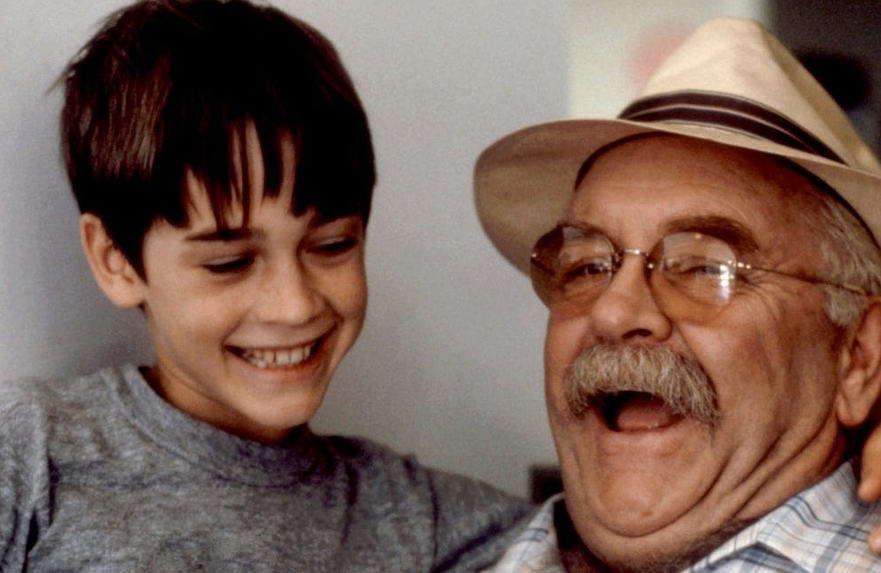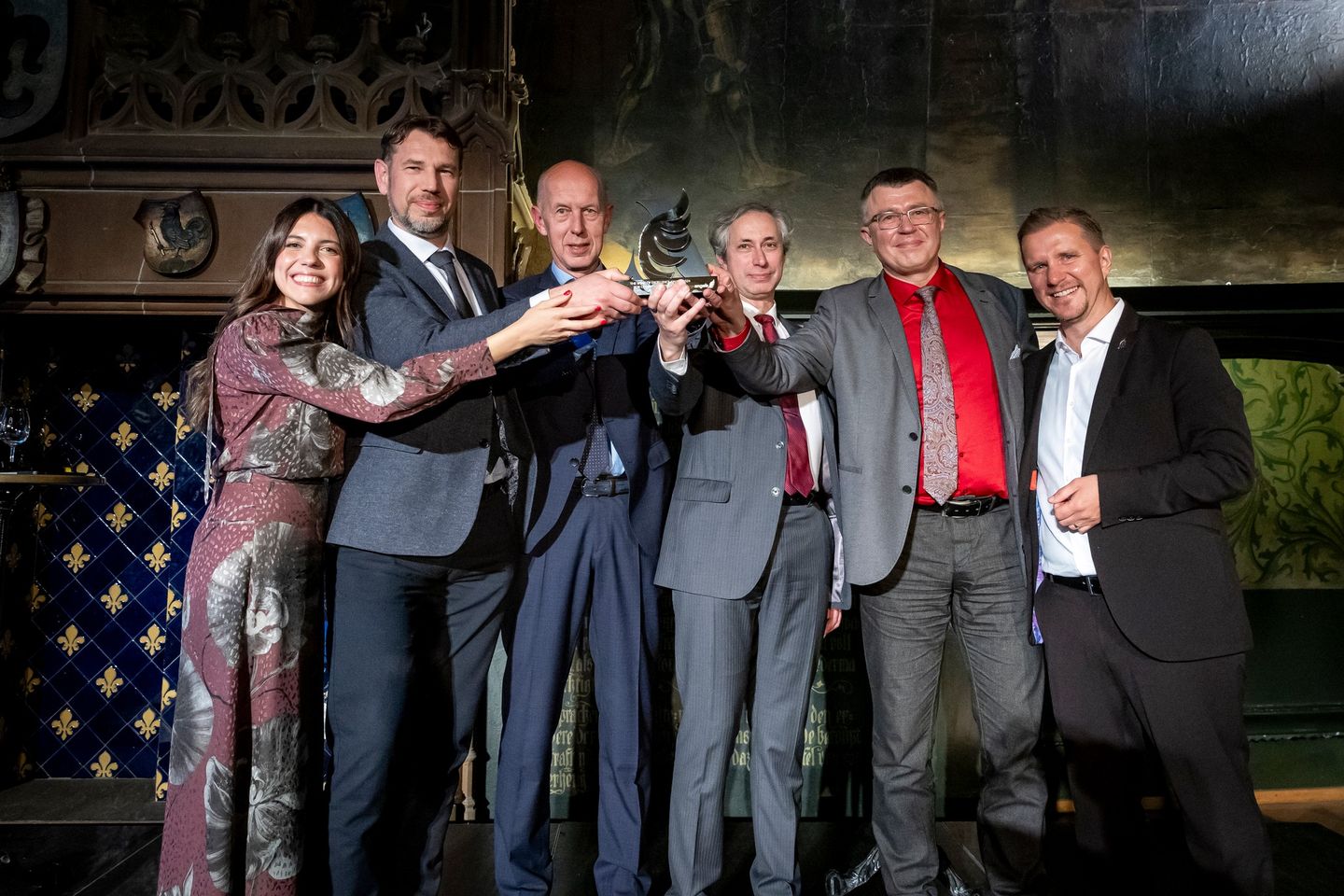
Litva hiện đại là một câu chuyện về hai thành phố vì mối quan hệ giữa Vilnius và Kaunas thường được đặc trưng bởi sự cạnh tranh. Cuộc thi không thân thiện về thành phố nào thể hiện bản sắc Lithuania thực sự diễn ra trong nhiều lĩnh vực – từ văn hóa, kinh tế, giáo dục và khoa học, đến các cuộc thi gay cấn trên sân bóng rổ.
Tuy nhiên, trong một lĩnh vực quan trọng, nó không có mặt một cách dễ thấy. Một liên minh mạnh mẽ giữa bốn nhà thần kinh học - hai người từ mỗi thành phố - đã chuyển đổi đào tạo đột quỵ ở Lithuania và trở thành chất xúc tác để cải thiện chất lượng chăm sóc đột quỵ ở một số quốc gia Đông và Nam Âu và Trung Á.
Trên sân khấu tại Basel, Thụy Sĩ, để nhận được Giải thưởng Tinh thần Xuất sắc của ESO trong ESOC 2024, Đội Lithuania xếp hàng như sau: Bên phải là Giáo sư Dalius Jatuzis từ Phòng khám Thần kinh và Phẫu thuật Thần kinh tại Đại học Vilnius. Bên cạnh ông, Giáo sư Aleksandras Vilionskis từ Bệnh viện Đại học Vilnius thuộc Đảng Cộng hòa. Đại diện cho Kaunas là Giáo sư Antanas Vaitkus và Giáo sư Vaidas Matijosaitis (bên trái), cả hai từ Khoa Thần kinh tại Bệnh viện Đại học Khoa học Y tế Lithuanian (LSMU).
Thật dễ dàng để đoán xem ai trong số bốn người này là lực lượng cần tính đến trên sân bóng rổ khi Giáo sư Vaidas Matijosaitis đứng trên các đồng nghiệp của mình. “Không chuyên nghiệp”, ông giải thích. Lý do chính của anh ấy để tận hưởng niềm đam mê quốc gia của Litva là "làm cho niềm vui và niềm vui cho bản thân", nhưng điều đó cho phép anh ấy nêu quan điểm về làm việc nhóm. Trong các bài giảng về chăm sóc đột quỵ, ông đề cập đến bóng rổ để thúc đẩy ý tưởng rằng “để chơi tốt, các bạn phải hiểu nhau”.
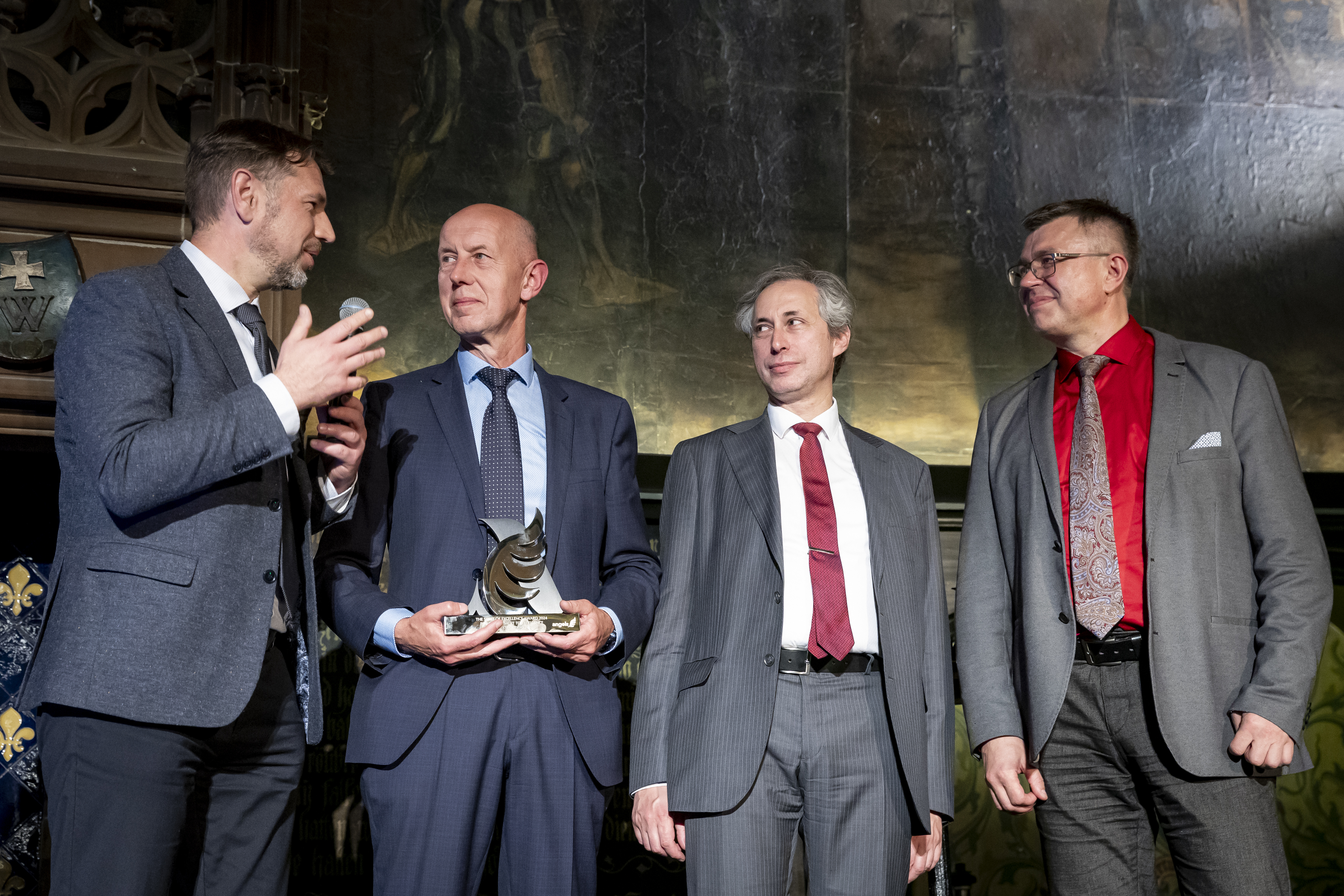
Một đội ngũ xuất sắc
Đội chuyển đổi đột quỵ Kaunas-Vilnius là đội chơi tốt cùng nhau. Họ có vai trò quan trọng trong việc phát triển chăm sóc đột quỵ ở Lithuania, kết hợp chuyên môn của họ để trình bày các hội thảo đào tạo cho y tá, EMS và các nhà thần kinh học trẻ tuổi, và thúc đẩy giám theo dõi chất lượng và học tập dựa trên mô phỏng.
Giáo sư Matijosaitis đã trở thành một người chuyển đổi sang đào tạo mô phỏng trong khi tham dự một sự kiện Đào tạo người huấn luyện luyện viên do Sáng kiến Thiên thần tổ chức tại Mainz, Đức, vào năm 2016. Đây là một giấc mơ để thành lập một trung tâm mô phỏng tại LSMU có thể phục vụ khu vực – một tham vọng đưa họ đến Đại học Masaryk ở Brno, Cộng hòa Séc để học hỏi từ một trong những trung tâm mô phỏng được yêu thích nhất ở Trung Âu.
Trung tâm mô phỏng ở Kaunas hiện đã phát triển thành một dự án quốc tế, nơi các thực hành tốt nhất được chia sẻ với các nhà lãnh đạo đột quỵ trong tương lai từ Hy Lạp, Bulgaria, Georgia, Moldova, Romania, Hungary và Ukraine. Họ cũng đã tổ chức các hội thảo mô phỏng ởMoldova và Kyrgyzstan, tiếp theo là Kazakhstan trong hành trình của họ.
Họ cũng là tấm gương. Cả bốn bác sĩ đều đến từ các bệnh viện kim cương và có hai mươi Giải thưởng Angels, nhưng chứng chỉ hoàn hảo không phải là lý do duy nhất khiến họ là một đội ngũ xuất sắc.
“Chúng tôi khác nhau theo nhiều cách, chúng tôi có những thế mạnh khác nhau”, Giáo sư Matijosaitis nói. “Một số người biết nhiều hơn về các thử nghiệm đột quỵ, một số biết nhiều hơn về tổ chức lộ trình, một số là chuyên gia trong quá trình mô phỏng. Nhưng nếu kết hợp tất cả lại với nhau, bạn sẽ có một kiến thức cốt lõi cần thiết. Nó giống như một câu đố, trong đó tất cả các chi tiết chính được sắp xếp cùng nhau. Chúng tôi là một nhóm hoàn hảo vì chúng tôi bổ sung kiến thức cho nhau.”
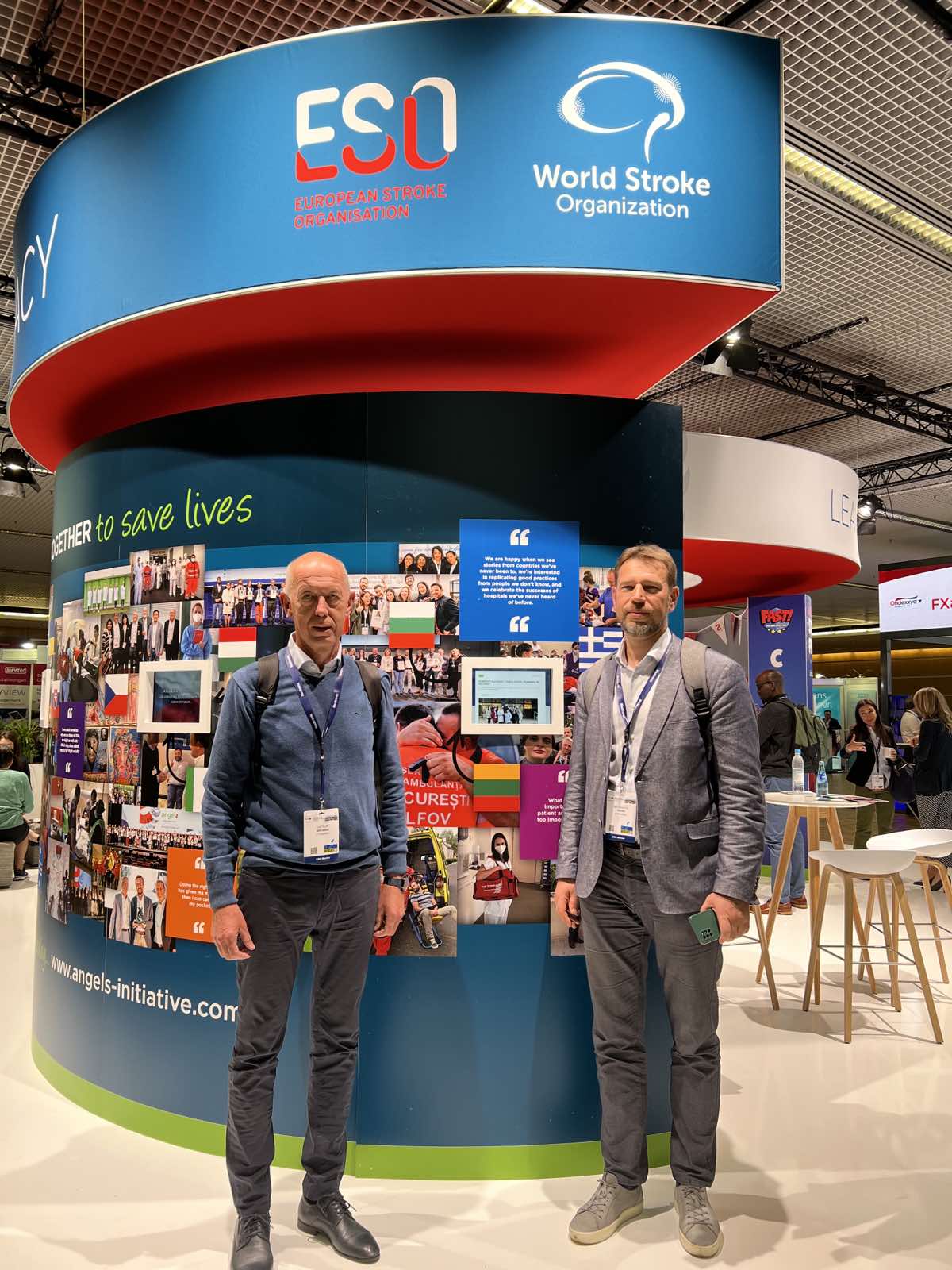
Theo đuổi bướm
Thành phố lớn thứ hai của Lithuania, Kaunas được biết đến với cả lịch sử và vẻ đẹp tự nhiên. Nằm ở hợp lưu của hai con sông lớn nhất của Lithuania, các hồ nước, rừng và khu bảo tồn thiên nhiên xung quanh là nơi sinh sống của nhiều loài trong số hơn 3.500 loài bọ cánh cứng và gần 2.500 loài bướm và sâu bướm.
Khi còn là một cậu bé, tình yêu khoa học của Vaidas Matijosaitis được nuôi dưỡng bởi một người hàng xóm, một nhà côn trùng học trong một xưởng lao động của bảo tàng ở Kaunas, người đã khuyến khích ông tìm và nghiên cứu côn trùng. Trong các lĩnh vực mà ông thu thập bướm và bọ, sự quan tâm của ông đến sinh học ngày càng tăng.
Là một bác sĩ trẻ, ông bị mê hoặc bởi những bí mật bị khóa trong não. Bác sĩ nội trú về thần kinh của ông tại Đại học Y khoa Kaunas đã cho ông thấy rằng đằng sau những bí mật này vẫn còn nhiều điều cần được làm sáng tỏ.“Khoa học về thần kinh học đang tiến lên rất nhanh”, ông nói. “Các phương pháp mới đang được phát hiện để chẩn đoán và quản lý các bệnh mà trước đây không có cách chữa trị.”
Chẩn đoán siêu âm là trọng tâm của các nghiên cứu tiến sĩ về khoa học thần kinh, mà ông đã bắt đầu thực hiện một năm sau khi hoàn thành chương trình cư trú vào năm 2006. Hồi đó, chưa đến một phần trăm số bệnh nhân đột quỵ thiếu máu cục bộ ở Lithuania đã trải qua liệu pháp tái can thiệp - kết quả của việc thiếu sự hỗ trợ của chính phủ và nguồn cung cấp thuốc tiêu huyết khối hạn chế.
Cuối cùng, vào năm 2014, quốc hội Lithuania đã phê duyệt Chương trình Y tế Lithaucia 2014-2025 (kế hoạch 10 năm để cải thiện sức khỏe dân số và giảm bất bình đẳng trong chăm sóc sức khỏe) và hỗ trợ phát triển hệ thống cụm đột quỵ với mục tiêu là có một bệnh viện sẵn sàng cho đột quỵ trong vòng một giờ với mỗi một trong số 2,8 triệu công dân Lithaunia.
Ngày nay, có 11 bệnh viện trong mạng lưới điều trị đột quỵ chính thức bao gồm sáu trung tâm đột quỵ sẵn sàng phẫu thuật cắt bỏ huyết khối.
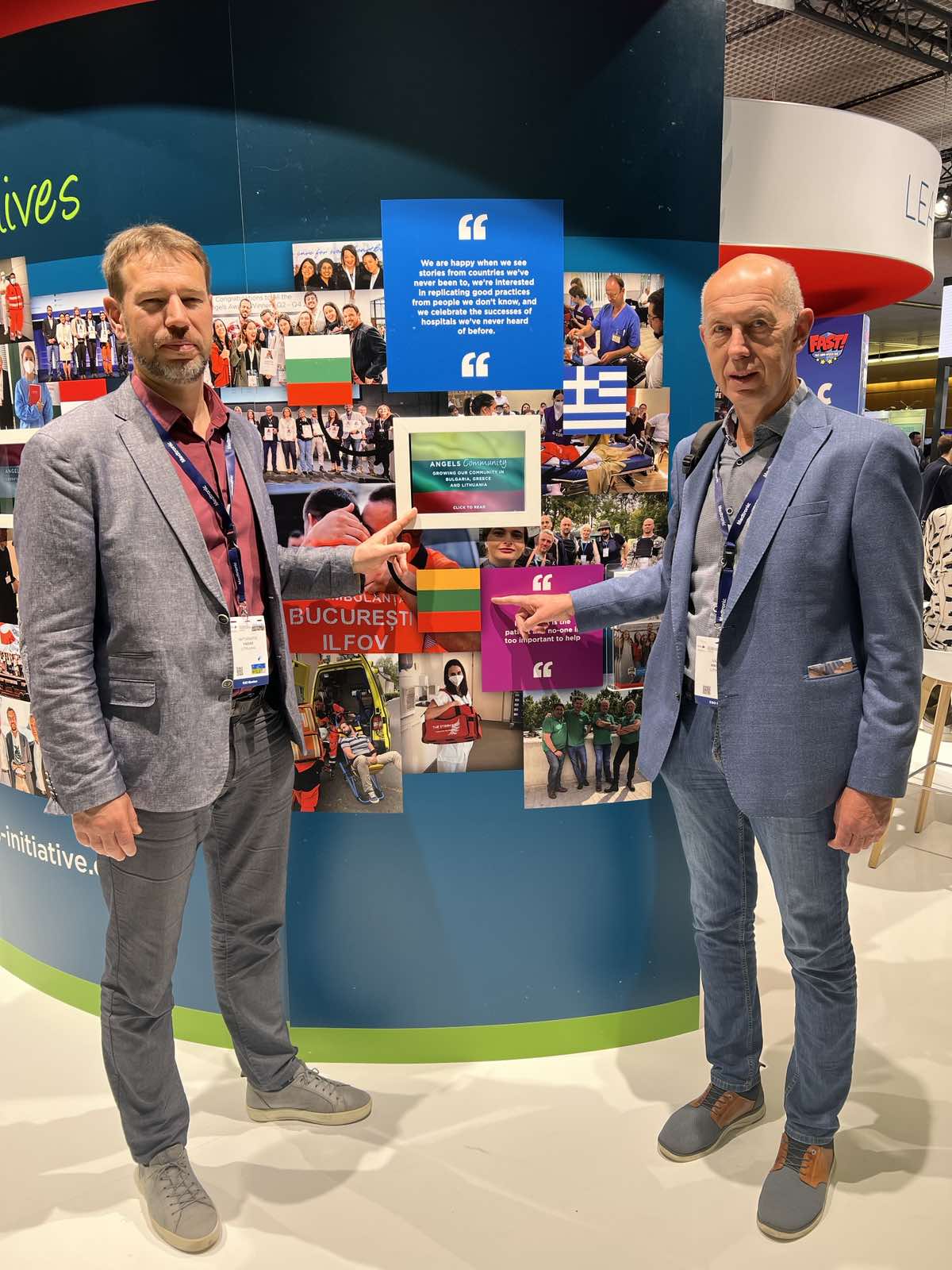
Tất cả bắt đầu từ ý tưởng của bạn
Sức mạnh của Giáo sư Matijosaitis trong việc gây ảnh hưởng đến việc hành nghề tại bệnh viện của ông đã tăng lên sau khi ông trở thành người đứng đầu đơn vị đột quỵ tại LSMU vào năm 2016. Các nhóm đột quỵ là các khối xây dựng của cụm đột quỵ, ông nói. Các nhóm nhỏ dễ dàng chỉ đạo theo hướng mới hơn so với các nhóm hoạt động trong các bệnh viện như LSMU, với 2.300 giường là tổ chức y tế lớn nhất và tiên tiến nhất ở các quốc gia Baltic. Mặc dù vậy, đội ngũ tại LSMU đã chơi tốt cùng nhau, tinh giản con đường để giảm thời gian giao hàng từ cửa đến kim từ 78 phút trong năm 2016 xuống dưới 30 phút.
Những gì Rita Rodrigues của Angels Initiative mô tả là “một con đường hoàn hảo” được hưởng lợi từ sự gần gũi rất tốt của việc phân loại đến khu vực đỏ và các phòng ICU, và có phòng chụp CT ở phía bên kia cửa. Ngoài môi trường được tối ưu hóa cho tốc độ, hệ thống thông báo trước viện kết nối xe cứu thương trực tiếp với bác sĩ thần kinh đang làm nhiệm vụ. Kể từ năm 2018, Lithuania cũng đã có một hệ thống y tế điện tử cho phép các chuyên gia chăm sóc sức khỏe tiếp cận với tiền sử bệnh nhân, thuốc men, các tình trạng có sẵn từ trước và các bệnh mãn tính mà trong trường hợp đột quỵ có thể chống chỉ định điều trị bằng Tiêu huyết khối.
Một chuyến tham quan đơn vị LSMUstrokeđột quỵ và các phòng cấp cứu và chẩn đoán hình ảnh là lời mở đầu cho việc đào tạo mô phỏng, giúp các bác sĩ đến thăm khám với các nguồn lực rộng lớn hơn nhiều so với các bệnh viện của họ.
Giáo sư Matijosaitis nói: “Những người đến rất có động lực – bắt đầu mô phỏng đột quỵ ở quốc gia của họ, phát triển hệ thống của riêng họ, để thực hiện tốt hơn, để giảm các thông số chất lượng”. đột quỵ “Họ có thể không có tất cả các lựa chọn chúng ta làm, nhưng tốt nhất là bắt đầu bằng cách thay đổi cách suy nghĩ của bạn. Tất cả bắt đầu từ ý tưởng của bạn. Chúng tôi cố gắng tạo ra tác động đến cách họ nghĩ về sự thay đổi.”
Tác động biến đổi của việc đào tạo mô phỏng đến từ việc phản ánh các tình huống và thách thức trong thế giới thực - nhưng trải nghiệm này cũng là tấm gương cho Giáo sư Matijosaitis và các đồng nghiệp của ông. Ông nói: “Điều quan trọng là phải nhìn rõ bản thân và công việc của mình từ bên ngoài. Bạn cũng sẽ thấy điều gì đó cần cải thiện.”
Một dự án chung khác của nhóm lãnh đạo đột quỵ Kaunas-Vilnius là Trường hè Đột quỵ ESO sắp tới mà họ, cùng với bác sĩ thần kinh cấp cứu Rytis Masiliūnas của Bệnh viện Đại học Vilnius, thành lập ủy ban tổ chức địa phương. Chương trình kéo dài từ ngày 15 đến ngày 21 tháng 9.


